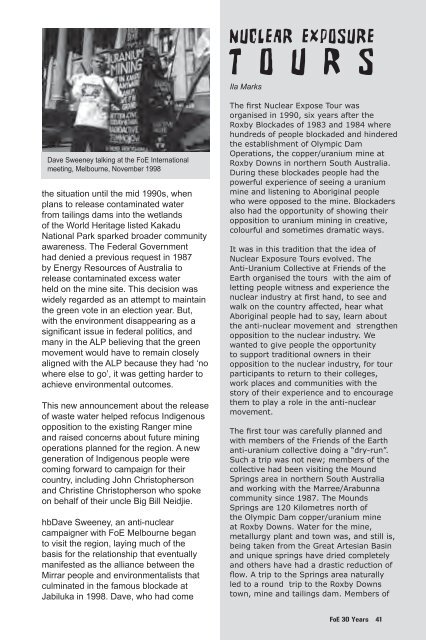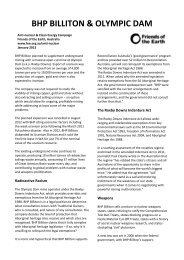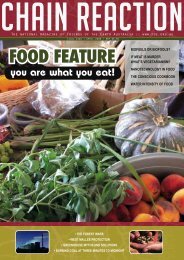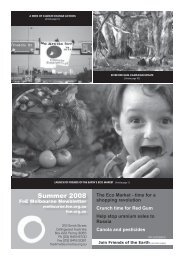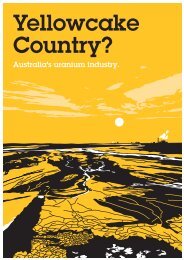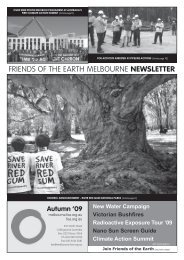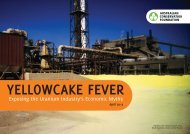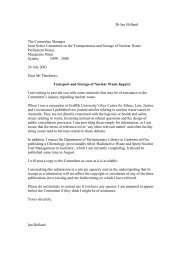Thirty Years of Creative Resistance - Friends of the Earth Australia
Thirty Years of Creative Resistance - Friends of the Earth Australia
Thirty Years of Creative Resistance - Friends of the Earth Australia
You also want an ePaper? Increase the reach of your titles
YUMPU automatically turns print PDFs into web optimized ePapers that Google loves.
Ila Marks<br />
Dave Sweeney talking at <strong>the</strong> FoE International<br />
meeting, Melbourne, November 1998<br />
<strong>the</strong> situation until <strong>the</strong> mid 1990s, when<br />
plans to release contaminated water<br />
from tailings dams into <strong>the</strong> wetlands<br />
<strong>of</strong> <strong>the</strong> World Heritage listed Kakadu<br />
National Park sparked broader community<br />
awareness. The Federal Government<br />
had denied a previous request in 1987<br />
by Energy Resources <strong>of</strong> <strong>Australia</strong> to<br />
release contaminated excess water<br />
held on <strong>the</strong> mine site. This decision was<br />
widely regarded as an attempt to maintain<br />
<strong>the</strong> green vote in an election year. But,<br />
with <strong>the</strong> environment disappearing as a<br />
significant issue in federal politics, and<br />
many in <strong>the</strong> ALP believing that <strong>the</strong> green<br />
movement would have to remain closely<br />
aligned with <strong>the</strong> ALP because <strong>the</strong>y had ‘no<br />
where else to go’, it was getting harder to<br />
achieve environmental outcomes.<br />
This new announcement about <strong>the</strong> release<br />
<strong>of</strong> waste water helped refocus Indigenous<br />
opposition to <strong>the</strong> existing Ranger mine<br />
and raised concerns about future mining<br />
operations planned for <strong>the</strong> region. A new<br />
generation <strong>of</strong> Indigenous people were<br />
coming forward to campaign for <strong>the</strong>ir<br />
country, including John Christopherson<br />
and Christine Christopherson who spoke<br />
on behalf <strong>of</strong> <strong>the</strong>ir uncle Big Bill Neidjie.<br />
hbDave Sweeney, an anti-nuclear<br />
campaigner with FoE Melbourne began<br />
to visit <strong>the</strong> region, laying much <strong>of</strong> <strong>the</strong><br />
basis for <strong>the</strong> relationship that eventually<br />
manifested as <strong>the</strong> alliance between <strong>the</strong><br />
Mirrar people and environmentalists that<br />
culminated in <strong>the</strong> famous blockade at<br />
Jabiluka in 1998. Dave, who had come<br />
The first Nuclear Expose Tour was<br />
organised in 1990, six years after <strong>the</strong><br />
Roxby Blockades <strong>of</strong> 1983 and 1984 where<br />
hundreds <strong>of</strong> people blockaded and hindered<br />
<strong>the</strong> establishment <strong>of</strong> Olympic Dam<br />
Operations, <strong>the</strong> copper/uranium mine at<br />
Roxby Downs in nor<strong>the</strong>rn South <strong>Australia</strong>.<br />
During <strong>the</strong>se blockades people had <strong>the</strong><br />
powerful experience <strong>of</strong> seeing a uranium<br />
mine and listening to Aboriginal people<br />
who were opposed to <strong>the</strong> mine. Blockaders<br />
also had <strong>the</strong> opportunity <strong>of</strong> showing <strong>the</strong>ir<br />
opposition to uranium mining in creative,<br />
colourful and sometimes dramatic ways.<br />
It was in this tradition that <strong>the</strong> idea <strong>of</strong><br />
Nuclear Exposure Tours evolved. The<br />
Anti-Uranium Collective at <strong>Friends</strong> <strong>of</strong> <strong>the</strong><br />
<strong>Earth</strong> organised <strong>the</strong> tours with <strong>the</strong> aim <strong>of</strong><br />
letting people witness and experience <strong>the</strong><br />
nuclear industry at first hand, to see and<br />
walk on <strong>the</strong> country affected, hear what<br />
Aboriginal people had to say, learn about<br />
<strong>the</strong> anti-nuclear movement and streng<strong>the</strong>n<br />
opposition to <strong>the</strong> nuclear industry. We<br />
wanted to give people <strong>the</strong> opportunity<br />
to support traditional owners in <strong>the</strong>ir<br />
opposition to <strong>the</strong> nuclear industry, for tour<br />
participants to return to <strong>the</strong>ir colleges,<br />
work places and communities with <strong>the</strong><br />
story <strong>of</strong> <strong>the</strong>ir experience and to encourage<br />
<strong>the</strong>m to play a role in <strong>the</strong> anti-nuclear<br />
movement.<br />
The first tour was carefully planned and<br />
with members <strong>of</strong> <strong>the</strong> <strong>Friends</strong> <strong>of</strong> <strong>the</strong> <strong>Earth</strong><br />
anti-uranium collective doing a “dry-run”.<br />
Such a trip was not new; members <strong>of</strong> <strong>the</strong><br />
collective had been visiting <strong>the</strong> Mound<br />
Springs area in nor<strong>the</strong>rn South <strong>Australia</strong><br />
and working with <strong>the</strong> Marree/Arabunna<br />
community since 1987. The Mounds<br />
Springs are 120 Kilometres north <strong>of</strong><br />
<strong>the</strong> Olympic Dam copper/uranium mine<br />
at Roxby Downs. Water for <strong>the</strong> mine,<br />
metallurgy plant and town was, and still is,<br />
being taken from <strong>the</strong> Great Artesian Basin<br />
and unique springs have dried completely<br />
and o<strong>the</strong>rs have had a drastic reduction <strong>of</strong><br />
flow. A trip to <strong>the</strong> Springs area naturally<br />
led to a round trip to <strong>the</strong> Roxby Downs<br />
town, mine and tailings dam. Members <strong>of</strong><br />
FoE 30 <strong>Years</strong> 41


